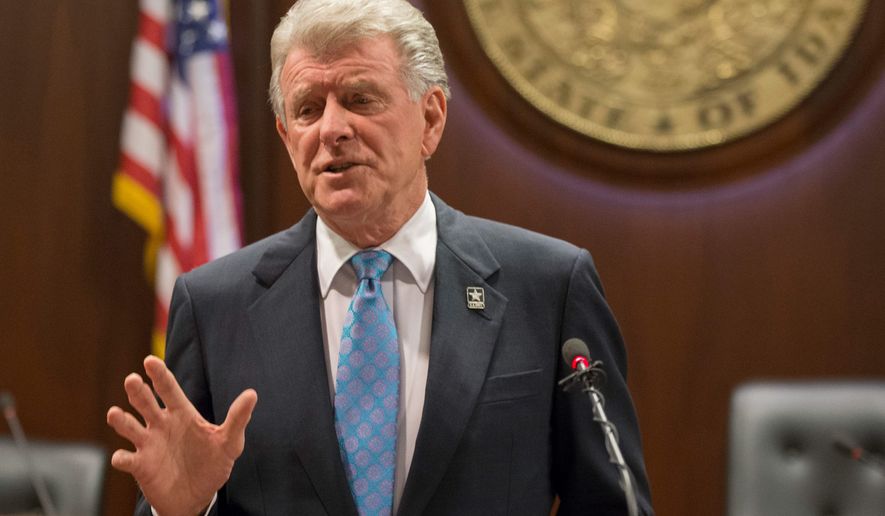Idaho Gov. C.L. “Butch” Otter, a Republican, used to say that accepting Obamacare’s expansion of Medicaid would be a betrayal of his state’s independence — and a severe drain on its budget.
On Tuesday, Mr. Otter changed his tune, announcing that he now backs a state referendum that would embrace Medicaid expansion and saying he can no longer stomach 62,000 Idahoans who are caught in a coverage gap by earning too much to qualify for Medicaid but too little to afford plans on Obamacare’s exchanges.
Mr. Otter’s decision is another signal the political ground under Obamacare has shifted, even in ruby red states, after President Trump and his Republican allies failed to repeal and replace the law as promised.
Besides Idaho, voters in Nebraska and Utah will get the chance to override Republicans who control the state legislatures and expand the federal-state insurance program for the poor. If all three succeed, up to 325,000 more people could be added to the rolls in 2019, according to Avalere Health, a D.C.-based consultancy.
Petitioners who secured the ballot questions are feeling confident. They say voters are sick of seeing their federal tax dollars fund coverage and health care industries in states that embraced the expansion from the get-go, especially as federal lawmakers struggle to find bipartisan solutions to health care reform.
“The partisan dam holding back full Medicaid expansion is breaking,” said Jonathan Schleifer, executive director of the Fairness Project, which led petition drives to put expansion on the red state ballots.
Voters in Montana, meanwhile, will decide whether to extend the expansion within their borders or let it expire next year, which would imperil coverage for 90,000. Recent polls say the issue is close, with the tobacco industry spending money in opposition because the expansion is funded by taxes on its products.
In Idaho, polls show 6 in 10 voters back Medicaid expansion.
“Allowing the health care coverage gap to persist any longer is not an option,” Mr. Otter said.
He’s not seeking re-election, perhaps giving him more political freedom to embrace a policy he used to decry.
His office insists he’s not actually changing his stance, saying he did back other efforts to extend some form of health care to residents who fell into the gap between Medicaid and qualifying for subsidized plans on Obamacare’s exchanges.
“The Legislature balked at all of them,” said Otter spokesman Jon Hanian. “Enough voters supported this issue to make it onto the ballot to allow the people of Idaho to decide the matter for themselves. He believes it is a matter of fairness and the right thing to do, which is why he is supporting it.”
Idaho Lt. Gov. Brad Little, a Republican hoping to replace Mr. Otter, has said he will respect the will of voters on expansion if he wins. His Democratic opponent, Paulette Jordan, supports the proposition.
Medicaid expansion has been the quiet workhorse of President Obama’s law, extending coverage to roughly 12 million people across 33 states and the District of Columbia. States must pay a growing share of the cost of expansion, though it will not exceed 10 percent in 2020 or beyond.
Republicans in holdout states say that’s too expensive, and they fear the federal government could change the deal to make it even more costly.
Of the 33 states that embraced expansion, only one — Maine — did it through referendum, though its implementation has been tied up in litigation with Gov. Paul LePage, who says supporters haven’t found a way to pay for it.
“Ballot initiatives are such powerful tools because they take the partisan labels off of ideas and give Americans a chance to come together around commonsense ways to improve life for working families,” Mr. Schleifer said.
Beyond Medicaid, voters will decide whether to establish a “right to life” in state constitutions. An amendment in Alabama, for instance, would recognize and support “the sanctity of unborn life and the rights of unborn children.”
Its main champion, state Rep. Matt Fridy, says he doesn’t want people to dig up a state-based way to uphold abortion if the Supreme Court overturns Roe v. Wade. Roe was the 1973 decision that protected the right to have an abortion.
West Virginia voters will weigh in on a similar amendment, while those in Oregon will vote whether to ban the use of public funds for abortion except in limited circumstances, such as to save the life of the pregnant person or cases of pregnancy resulting from rape or incest.
The dialysis industry in California, meanwhile, has spent $111 million to try to defeat “Prop 8,” an initiative that would cap clinic profits by forcing them to issue refunds to patients and their insurers for any revenue above 115 percent of the cost of patient care.
• Tom Howell Jr. can be reached at thowell@washingtontimes.com.




Please read our comment policy before commenting.